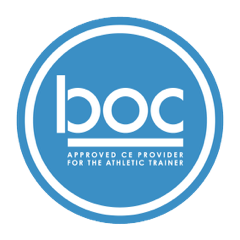Discounts
If you are an RMU alumnus, employee, or a Uniformed Service Member, please submit this form before registering for the course to apply for a discount code.
Description
The purpose of this course is to provide a historical, biophysical, and evidence based effects of IASTM and one other cutaneous manual therapy and discuss the importance of training and certification in these techniques. There are several techniques available to clinicians to use as soft tissue interventions to remedy tendinopathy, muscle/tendon pain, and joint dysfunction. Albeit the techniques are many, few have supporting evidence and some have differing theoretical basis. To further complicate matters; many companies lean on the evidence studied among other techniques in order to provide rational for their product. This course will provide the listener the evidence for pain management using two established and researched cutaneous manual therapy techniques, as well as address the harm in extrapolating evidence. Participants would be those interested in the evidence for pain management using these techniques.
Objectives
Upon successful completion of this course, the student will be able to:
- Identify and discuss the timeline of events that led to the development of IASTM in the United States
- Identify the body’s biophysical response to treatments using IASTM and similar treatments
- Differentiate between IASTM and other cutaneous manual therapy techniques
- Compare the current evidence regarding the use of two cutaneous soft tissue manual therapy treatments on muscle/tendon pain
- Consider clinician recommendations for best IASTM and cutaneous manual therapy treatment practices and professional development
- Consider limitations of this EBP course
Format
This course is self-paced and must be completed within 1 year of registration. All content is online, with no synchronous sessions.
Credits

This course qualifies for 2 Category A CEUs approved by the BOC.
Primary Audience
Clinicians who use instruments during the application of soft tissue mobilization techniques for tendinopathies, pain, or joint dysfunction. These clinicians most likely include AT, PT, PTA, OT, OTA, and may include MD, DO, DC, and/or physiotherapists.
Faculty
Andrew Doyle, PhD, LAT, ATC, CSCS, Astym-Cert
Andrew Doyle has been in the world of athletic training since 2005. He attended Indiana Wesleyan University for Athletic Training. Following his undergraduate education, he attended Western Michigan University and attained his master’s degree. In 2017, Dr. Doyle earned his PhD at RMUoHP in Athletic
Training. Since 2007, Dr. Doyle has been educating athletic trainers while maintaining a clinical practice.
Currently, he is an adjunct professor at Trine University in the Doctor of Physical Therapy Program
teaching evidence-based practice and facilitates research. Dr. Doyle also works as a clinical athletic
trainer at Parkview Hospital in Fort Wayne, IN, and assists with the development of the Athletic Training Residency there. In addition to these duties, he is also the President and Director or Clinical Intervention at Elevate Wellness Solutions, LLC. Read more
Adam Thompson, PhD, LAT, ATC, GTS
Dr. Adam Thompson serves as the Chair of the Division of Health and Human Performance at Indiana Wesleyan University, where he is a Professor of Athletic Training. Prior to his current position, Dr. Thompson served as the Director of the Athletic Training Program from 2004-2019. He received his undergraduate athletic training degree from Anderson University in Anderson, IN, and his Masters of Science degree in physical education from Ohio University in Athens, OH. He earned his doctorate degree from Capella University in Minneapolis, MN, specializing in Health Care Administration. Adam is active with patients providing clinical care to IWU’s men’s and women’s cross country and golf teams as well as volunteering as an orthopedic healthcare provider at Bridges to Health, a free healthcare clinic in Marion, IN. In addition, he is part of the sports medicine support team for the Olympic fencing teams of Team USA. Dr. Thompson’s research interests involve chronic stress and burnout in health care as well as manual therapy clinical interventions.
